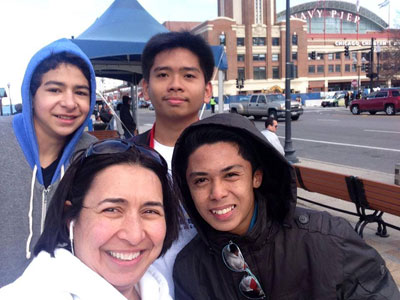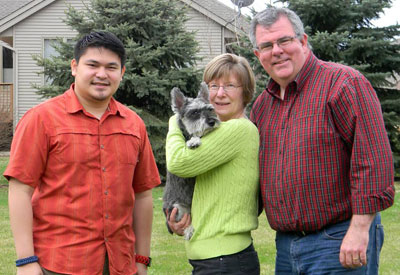
Kareem Elsawa (left) and Sherine Elsawa enjoy a day at Navy Pier in Chicago with their 2014 PYLP participants Termizie Masahud and Earl Padayao.
For Sherine Elsawa, an assistant professor of biology at NIU, hosting international students for short-term home stays has been all about giving her son the experience of having brothers – if only for weeks at a time.
“We decided to host because Kareem is an only child, and we thought it might be a good experience to have these kids with us for a week or two. We loved it so much we kept hosting,” says Elsawa, who over the past several years has hosted six students for two U.S. Department of State youth leadership programs based at NIU.
The experience has given her family more than Elsawa expected.
“While we hope we gave those boys that have stayed with us a memorable experience in the U.S., they have certainly given us many great memories,” Elsawa says. “We have learned so much about the different countries and cultures, the different religious backgrounds and the universal similarity that teenage boys have regardless of the distance.”
Elsawa is hosting again during the upcoming Southeast Asia Youth Leadership Program (SEAYLP), which takes place from April 1 to April 26 and is administered by the Center for Southeast Asian Studies (CSEAS).
CSEAS and the International Training Office (ITO), which administers the Philippine Youth Leadership Program (PYLP) from April 11 through May 7, are both actively seeking host families from the NIU community and surrounding area.
CSEAS is looking for 36 families to host either a pair of high school students or one adult leader from 10 Southeast Asian countries for one week, from April 5 to April 13. ITO is looking for 16 families to host for two weeks, from April 19 to May 2.
For 12 years, PYLP has brought young people and adult leaders from the Autonomous Region of Muslim Mindanao and surrounding provinces in the southern Philippines to NIU for four weeks of leadership training.

Adult leader Ryan Gonzales, a high school English teacher from the Philippines, left, was matched with Kim and Paul Crawford, director of Community College Relations, for the spring 2014 session of SEAYLP.
This is the eighth time CSEAS has conducted SEAYLP, which brings to campus students and adult leaders chosen by the US embassies in Brunei, Burma/Myanmar, Cambodia, Indonesia, Laos, Malaysia, the Philippines, Singapore, Thailand and Vietnam for three weeks of training in civic activism.
For the home-stay portion of both programs, students are placed in pairs and adults can be placed as singles. Host families provide a bed for each participant, breakfast each day and most dinners, all meals during any weekend days at home and transportation to and from class sessions at NIU.
Over the years, a number of NIU faculty and staff have taken advantage of the opportunity to open their homes more than once to international guests.
Paul Crawford, director of Community College Relations, has hosted twice for SEAYLP.
“Serving as a host family is an exquisite privilege,” Crawford said. “Host families help to create the conditions for intercultural learning, which leads to understanding, cooperation and trust. Our family sees the world through lenses clarified by our guests from Singapore and the Philippines. What could be better?”
SEAYLP home-stay applications are due Friday, March 20, with families notified of their matches by Monday, March 23. For information, call (815) 753-1901 or email edenius@niu.edu.
PYLP applications are due Friday, April 3. For more information and an application, call (815) 753-9546 or email lshive@niu.edu.
SEAYLP and PYLP are funded by the State Department’s Bureau of Education and Cultural Affairs.
